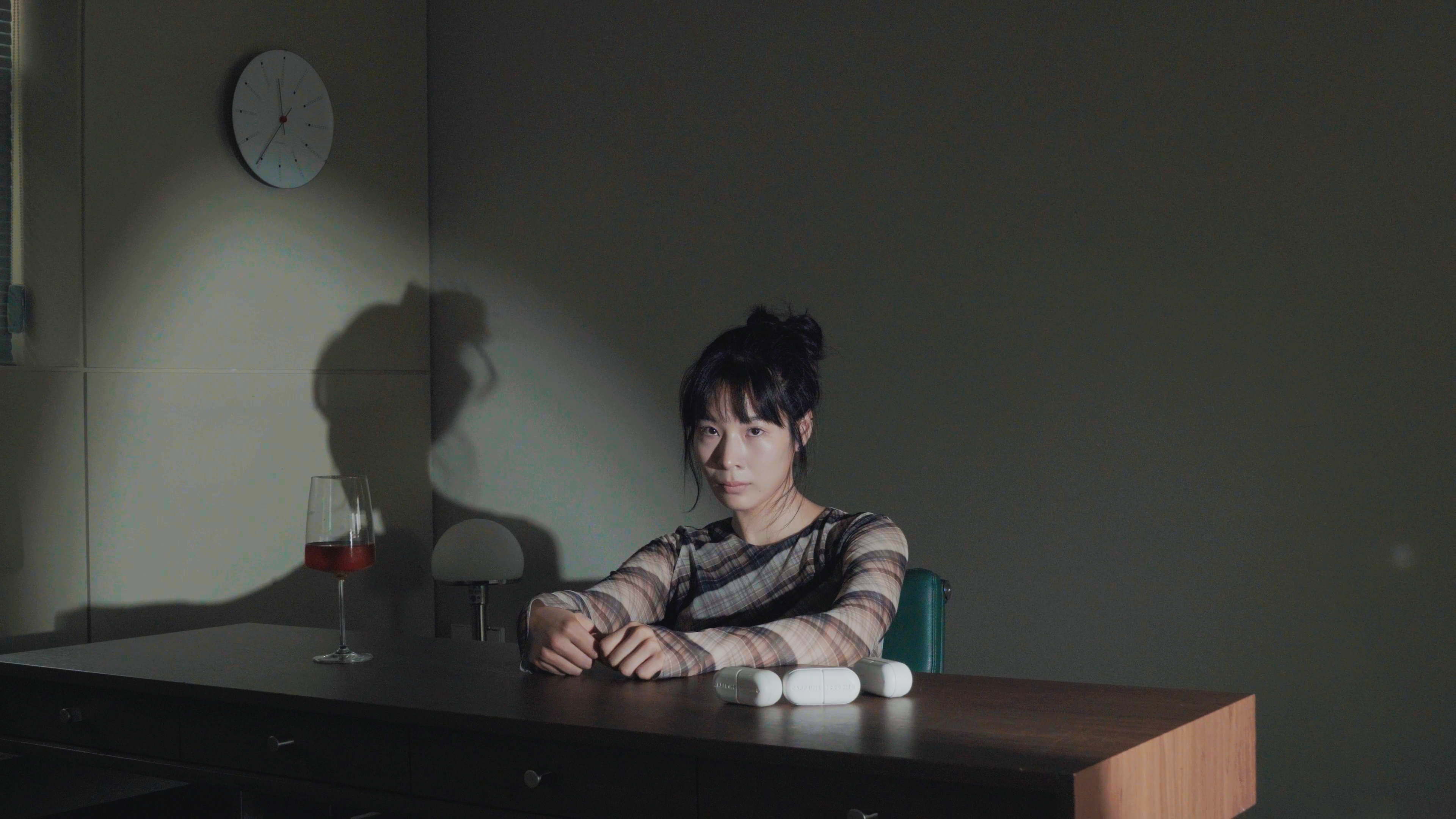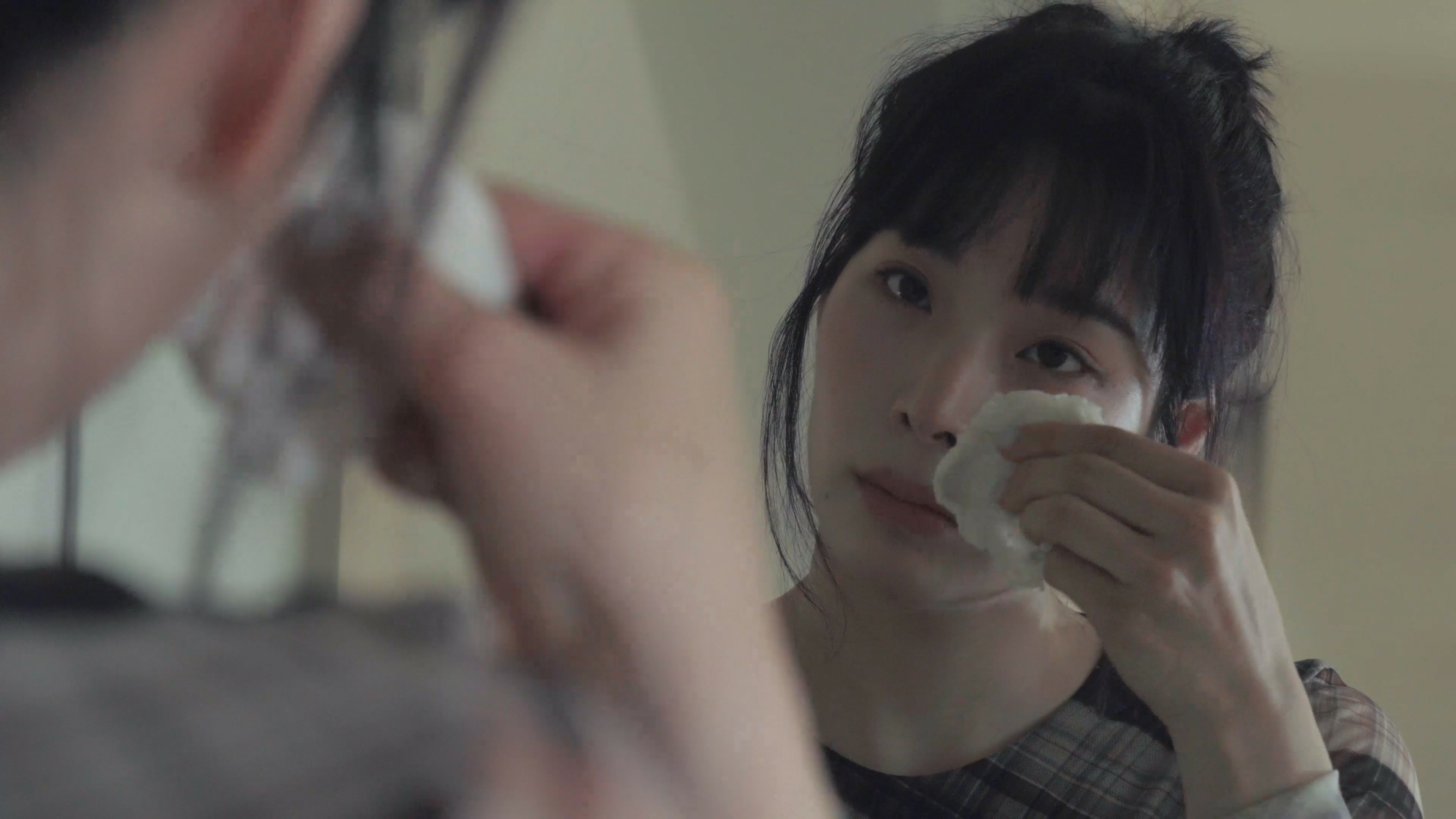
Dea’s Day, 2025, 2-Channel video loop (colour, sound)
Ch.1: 18mins 38sec, Channel.2: 3mins 24sec


<I AM Conquered- Species Safari >, Boan1942, Inatallation View
Dea’s Day, 2025,
2-Channel video loop (colour, sound)
Ch.1: 18mins 38sec, Channel.2: 3mins 24sec
하루를 효율적이고 생산적으로 살아가려는 라이프 코칭 인플루언서 ‘데아리’는 생산성이라는 허상을 쫓는 동안 점점 깊어지는 공허함, 번아웃, 불안을 마주하게 된다. 이 작업은 한 인플루언서의 일상을 따라가며, 주인공의 하루와 내면을 함께 조명한다.
작품은 신자유주의적 자기계발 담론과 플랫폼 자본주의의 논리 속에서, 개인이 끊임없이 자신을 계발하고 최적화해야만 하는 동시대적 현실을 반영한다. 데아리는 데이터로 분해되고, 알고리즘에 의해 움직이며, 자기 계발 컨텐츠를 생산하는 일상을 살아간다. 그녀의 일상은 소셜 미디어 속에서 스스로를 상품화하고 효율화하는 과정을 반복하는 가운데, 인공지능의 흐름에 종속된 채 주체성을 점점 상실해간다. 그렇게 ‘정복당하는 존재’로서의 무력감을 경험하게 된다.
영상은 단편영화 형식과 자기계발 컨텐츠 영상의 문법을 참조한 2채널 비디오 설치로 구성된다. 메인 스크린에서는 영화 형식을 차용하여 주인공의 하루의 시작과 끝을 보여주며, 영상의 중반부에는 데아리가 만든 자기 계발 컨텐츠와 강연 장면들이 삽입된다. 총 3파트로 이루어진 영상은 시작과 끝이 연결된 비디오 루프로 플레이된다. 또 다른 보조 스크린에서는 데아리의 내면 독백 영상이 동시에 상영되어, 외면적 퍼포먼스와 감정의 간극을 드러낸다.
이처럼 본 작품은 데아리의 일상 루틴과 전략화된 컨텐츠 생산 노동이 교차되며, 현실과 허구, 퍼포먼스와 진심 사이의 긴장을 입체적으로 구성한다.
정복과
전복: 최적화된 자아로부터 탈주하기 (일부발췌)
글: 류희연
모두가 서로에게 닿을 수 있고, 누구나 발화할 수 있으며, 무엇이든 선택할 수 있다고 믿게 만드는 세계. 그 감각은 ‘자유’라는 이름으로 유통되며, 우리에게 무한한 가능성의 이미지를 끊임없이 주입한다. 그렇게 구성된 자유는 개인의 욕망과 불안을 동력 삼아 자신을 갱신하고 확장하는 데에 탁월하게 작동하며, 특정한 질서와 리듬 속에서 우리 일상에 스며들었다. 선택하고 말하고 연결된다는 감각은 이제 필수 불가결한 전제가 되었고, 그 전제 속에서 우리는 정해진 방향으로 움직이고 있다는 사실을 인지하지 못한 채, 자유라는 감각 그 자체를 누리며 살아간다. 그러나 그 자유는 언제나 어떤 구조 안에서만 허용되어 왔고, 그 구조는 자신을 지우는 방식을 통해 더욱 치밀해졌다. 우리는 이를 망각한 채, 가능하다는 감각 속에 머무르는 법을 배워왔다. 어느 순간부터 인간의 존엄과 자유를 약속하던 정치적 이상은 시장의 언어로 대체되어 왔고, 자유는 선택의 권리가 아니라 끊임없이 선택하도록 강제되는 조건이 되었다. 그렇다, 우리는 ‘그것’을 오인했고, 수용했고, 때로는 정교하게 구체화했다.
욕망은 정해진 형식에 따라 배정되었고, 선택은 설계된 경로 위에서만 가능했다. 자율성은 이상을 이끌며 주어진 형식으로부터 이탈하는 능력이 아니라, 주어진 경로 위에서 규율된 수행으로 치환된다. 그렇게 자율은 계산 가능한 변수로 축소되고, 개성은 알고리즘이 선별해 주는 취향으로 정렬된다. 효율적으로 조율된 세계에 최적화된 개인은 착취의 생산성을 증명하는 존재가 되어 보이지 않는 체제에 반복적으로 응답할 뿐이다. 현재 우리가 직면한 다중적 위기에 대한 반성조차 정형화된 틀 안에서 소비될 뿐, 전환의 계기로 이어지지 못하고 있다. 이러한 굴레 속 다양한 존재와 영역과의 공존은 설 자리를 잃어가고, ‘종’이라는 개념은 더 이상 생물학적 구분에만 머물지 않으며, 자본의 흐름 속에서 새로운 분류로 재편된다. “생동하는 생명의 역학이 기술화된 자본주의라는 기업의 현실과 만나며, 그것은 착취 양식과 인식론적 틀” [1]로 전이되었기에 다양한 종은 감시와 표준화의 풍경 속에서 재배치되고 있다.
의심받지 않는 일상, 그 이면에 매끄럽게 작동하는 현실 속에서 정복은 시작된다. 정복은 더 이상 사건이 아니라, 질서의 방식이자 세계를 유지하는 무대 뒤의 조건이 되었다. 그것은 무력을 동반한 침입이나 일방적인 점유로 드러나지 않는다. 오히려 우리의 일상 깊숙이 스며들어, 강제를 동반하지 않으면서도 자연스럽게 선택을 유도하고, 행동을 설계한다. 그렇게 우리는 알지 못하는 사이, 감각을 조정하는 법을 익히고, 언어는 점차 예측 가능한 구조에 변화한다. 이제 정복은 외부로부터의 위협이 아니라, 내부로부터 조율되는 순응의 양식으로 작용하게 된 것이다. 《나는 정복당했다 – 종의 사파리》는 이러한 정복의 경험을 지나간 시제로 호출하지 않는다. 전시는 정복이 어떻게 감각되고 구성되었는지를 인지하는 동시에, 앞으로 일어날 또 다른 정복의 가능성에 대비하는 하나의 예행연습으로 기능하고자 한다. 전시에 참여한 세 명의 작가 박소라, 장우주, 정서희는 옴니버스 방식으로 구성된 각자의 작업을 통해 정복을 둘러싼 사유의 지형을 입체적으로 담아낸다.
박소라는 신자유주의 시스템이 개인의 행동양식과 언어를 어떻게 형성하고 지배하는지, 특히 플랫폼 환경에서 개인이 자신을 어떻게 효율적으로 재생산하는지에 주목해 작업을 이어오고 있다. 이번 전시에서 선보이는 <데아리의 하루>(2025)는 하루를 효과적이고 생산적으로 살아내려는 라이프 코칭 인플루언서 ‘데아 리(Dea Lee)’의 일상을 따라간다. 단편영화의 형식과 자기 계발 콘텐츠의 문법을 참조한 이 작품은 데아리의 일상 루틴과 전략화된 콘텐츠 생산 노동을 보여준다. 작품 속 데아리는 ‘데이터로 기록하고 분석하세요’, ‘당신의 이미지를 디자인하세요’, ‘일상을 자동화하고 빠르게 실행하세요’ 등 일련의 코칭 콘텐츠를 통해 자기 계발을 지속하며, 이를 다시 플랫폼에 유통한다. 더 나은 자아상을 만들기 위해 시스템의 분석을 기다리거나, 타인에게 보일 모습을 설계하며 사회가 이상적으로 여기는 긍정적이고 행복한 개인을 좇는다. 나아가 선택과 결정을 스스로가 아닌 시스템에 위임하는 편리함 속에서, 데아리는 자동화된 실행을 반복하며 가속화되는 자기 최적화의 과정에 몰두한다. 그러나 이러한 자기 계발 서사를 충실히 따르면서도, 타인과의 차이를 증명하고자 하는 그녀의 욕망은 매끄럽게 구성된 자아의 표면에 끊임없이 들러붙고, 해소되기 어려운 불안감은 현실과 계속해서 어긋난다. 불투명한 플랫폼 시스템 안에서 그녀는 점차 데이터 단위로 분해되고, 알고리즘에 의해 움직이며, 콘텐츠를 생산하고 소비하는 순환 구조에 종속된다. “이윤 생산이 장기적으로 하락하고 제조업이 부진에 빠진 오늘, 자본주의가 경제성장을 회복하고 활력을 유지하는 수단으로 데이터에 눈을 돌렸다” [2]는 점을 상기해 볼 때, 작가는 데이터화된 삶 속에서 유연화된 개인이 형성되고 발현되는 방식을 주목하며, 그 과정에서 드러나는 긴장과 균열을 면밀히 관찰한다. 그렇게 형성된 이상화된 자아는 자유의지를 실현하는 자율적 주체라기보다, 시스템에 의해 정복된 채 능동과 무력 사이를 오가는 존재로 남는다.
[1] 유시 파리카, 『미디어의 지질학』, 심효원 옮김, 현실문화: 서울, 2025, pp. 43-44.
[2] 닉 서르닉, 『플랫폼 자본주의』, 심성보 옮김, 킹콩북: 서울, 2020, p. 13.
Conquest and
Subversion: Escaping the Optimised Self (excerpted in part)
Text by
Heeyeon Ryu
We inhabit a world that convinces us we are all connected, that anyone may speak, and that everything is a matter of choice. This pervasive sentiment circulated, under the name of ‘freedom’, relentlessly infuses us with visions of infinite possibility. Such a constructed sense of freedom, propelled by individual desire and anxiety, functions with remarkable efficacy to renew and expand the self. It permeates our daily lives within particular orders and rhythms. The sensation of choosing, of speaking, of being connected has become a fundamental premise. Yet within that premise, we move in predetermined directions, largely unaware, while continuing to experience the feeling of freedom itself. However, this freedom has always been granted only within specific structures that have grown increasingly sophisticated by virtue of their capacity for self-erasure. We have learned to remain suspended in the illusion of possibility. At some point, the political ideals that once promised human dignity and liberty were displaced by the language of the market. Freedom no longer denotes the right to choose; rather, it becomes a condition of being compelled to choose constantly. Indeed, we have misunderstood it, embraced it, and at times concretised it with precision.
Desire is allocated according to pre-established formats; choice is only viable along predesigned trajectories. Autonomy no longer signals the capacity to deviate from the given form, but instead becomes a regulated performance confined to those paths. Self-determination is thus reduced to a calculable variable, individuality reorganised into preferences curated by algorithms. The individual, optimised within a finely calibrated world, becomes a figure of productivity, repeatedly responding to an invisible regime. Even our critical reflection on the multiple crises we face today is consumed within formulaic frameworks, failing to lead to genuine transformation. Amidst this entrapment, the possibility of coexistence between various beings and realms is gradually eroded. The notion of 'species' extends beyond biological distinctions and is reclassified according to the flow of capital. As Jussi Parikka has observed, "the dynamics of living organisms meet the corporate reality of techno-capitalism, transforming into a mode of exploitation and an epistemological framework."[1] In such a landscape, species are reordered within the vistas of surveillance and standardisation.
In a world where seamless reality operates behind the scenes of an unquestioned everyday life, conquest begins. Conquest is no longer an event – it has become a method of governance, a backstage condition for the maintenance of the world. It does not present itself through armed invasions or unilateral occupation. Rather, it infiltrates our daily lives, inducing choices and shaping behaviour without explicit coercion. We learn, unknowingly, to recalibrate our senses, and our language increasingly conforms to predictable structures. Conquest now acts not as an external threat, but as an internally regulated mode of compliance. I AM Conquered does not recall this experience of conquest in the past tense. Instead, it functions as a kind of rehearsal: a practice of recognising how conquest is sensed and constructed, while anticipating future forms it may yet take. The three participating artists – Sora Park, Wooju Chang, and Sophie Jeong – each articulate the landscape of thought surrounding conquest through works that are arranged in an omnibus format, rendering its contours multidimensional and layered.
Sora Park explores how neoliberal systems shape and dominate behavioural patterns and linguistic frameworks, focusing on how individuals reproduce themselves efficiently within platform environments. In this exhibition, her work Dea Lee’s Day (2025) follows the routine of ‘Dea Lee’, a lifestyle coach and influencer striving to live each day with maximum productivity. Adopting the format of a short film and the grammar of self-help content, the piece documents Dea Lee’s strategically designed routines and content production. Her day unfolds through a series of coaching slogans such as “Record and analyse your data”, “Design your image”, and “Automate your routine and execute fast”. She perpetually refines herself through self-optimisation, continually redistributing this practice across platforms. In her pursuit of an idealised self, Dea Lee awaits system-generated feedback, designs her projected identity, and chases the societally sanctioned image of happiness and positivity. She finds comfort in delegating decision-making to the system, endlessly repeating automated actions within the accelerating cycle of optimisation. Yet her desire to prove herself different from others clings to the polished surface of this self-construction. A residual anxiety persists – her idealised self remains out of sync with the uncertainties of reality. Trapped within the opacity of platform logic, she is gradually decomposed into units of data, animated by algorithmic directives, and absorbed into a feedback loop of content production and consumption. Nick Srnicek notes that “as profits have declined and manufacturing faltered, capitalism has turned to data as a new engine for growth.”[2]Park’s work focuses on how the flexible, datafied individual is formed and expressed, closely observing the tensions and fractures that emerge in the process. The idealised self, far from being an autonomous subject, becomes a being conquered by the system – oscillating between agency and inertia.
[1]Jussi Parikka, A Geology of Media, trans. Shim Hyowon (Seoul: Hyunsilmunhwa, 2025), 43–44.
[2]Nick Srnicek, Platform Capitalism, trans. Shim Sungbo (Seoul: Kingkongbook, 2020), 13.